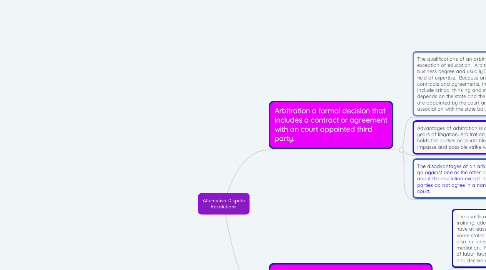Alternative Dispute Resolutions
by LeAnn Padgett

1. Arbitration a formal decision that includes a contract or agreement with an court appointed third party.
1.1. The qualifications of an arbitrator is similar to mediator with the exception of education. Arbitration requires a low degree or a business degree and usually 5-10 years experience within the field of expertise. Because an arbitrator has the ability to write contracts and agreements, the law degree is crucial. The skills include critical thinking and strong decisive reasoning. Licensing depends on the state and the court involved. Most arbitrators are appointed by the court and therefore need to show an association with the state bar.
1.2. Advantages of arbitration is a faster resolution than months or years of litigation. Arbitration can be binding or non binding and holds the parties accountable for the decisions. Avoids an impasse and possible strike with high costs.
1.3. The disadvantages of an arbitrator is that the decisions made can go against one or the other party. There is so choice or discussion about the resolution except in the non binding arbitration. If the parties do not agree in a non binding arbitration, the case moves to court.
2. Mediation is a third party go between to help resolve conflict. The mediator does not have to have a law degree to provide this service.
2.1. The qualifications of a mediator are experience, knowledge or training, education and skills. The court appointed mediator must have at least a BS in education and in some cases a doctorate. Some states require licensing or certification. The field of mediation also includes knowledge of the law or statutes in the area of mediation. For example, labor disputes would require a knowledge of labor laws. Skills would include the ability to listen, be objective and decision making or critical thinking.
2.2. The advantages of mediation is a speedy decision, avoiding costly litigation and lengthy business interruptions such as strikes. The mediator keeps both parties negotiating and searching for a resolution. The issue and mediation are kept confidential and personal.
2.3. The disadvantages of mediation is that both parties may not agree to the decision and meet with an impasse or fail to find a resolution and the case goes to litigation.


